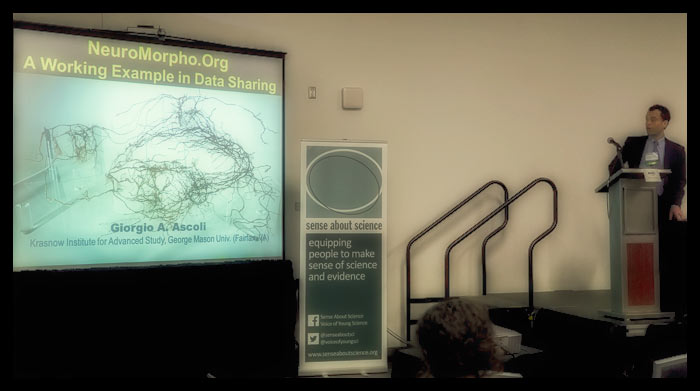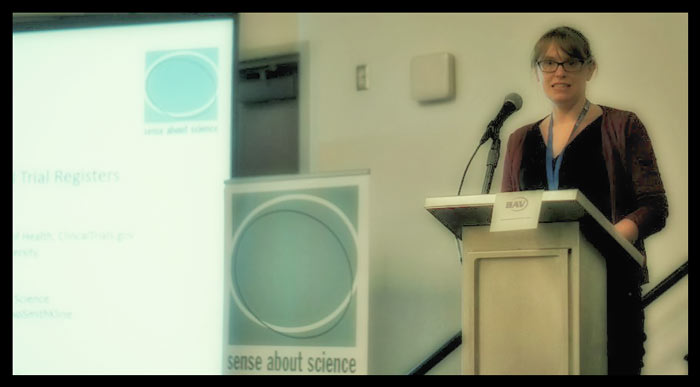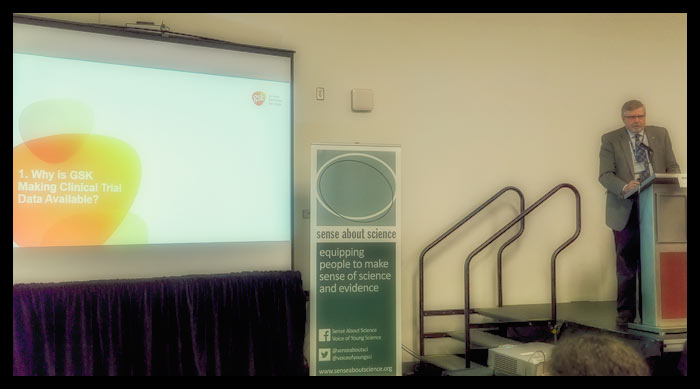Clinical Trial Registries: Entering a Brave New Transparent World

It was once the case, said George Mason University’s Giorgio Ascoli, that people thought gene discovery would rapidly lead to the patenting of genes. “Now,” he said, “you can’t publish if your data isn’t in a gene bank.”
Ascoli was speaking at Sense About Science’s panel discussion on innovations in clinical trial registries at the American Association for the Advancement of Science annual meeting in San Jose. The February 15 panel was focused on discussing the need—identified by the AllTrials campaign—for all clinical trials to be registered and reported, something that is only begun to happen in recent years. The campaign’s focus, however, is the past—the black hole in medicine where half of clinical trials have never been registered or their results published.
Ascoli’s comment was a timely reminder scientists themselves control and create the culture of science, and that shaping this culture can be as significant to scientific progress as scientific discoveries themselves. As founding director of the Center for Neural Informatics, Structures, and Plasticity at George Mason University’s Krasnow Institute for Advanced Study, Ascoli helped to create of Neuromorpho.org, an open-access library of 3D digitally constructed neurons curated from over 100 laboratories worldwide. He argued that critical mass is the most important factor in data sharing. In other words, the more data is shared, the more people will share data. The goal should be to get to a point where scientists can use the equivalents of Hotels.com or Expedia to find the data they need.

Sile Lane of Sense About Science explains why registering and reporting all clinical trials is critical for medicine.
One obstacle to that, said Elsevier’s Anita de Waard, was “a lack of cyber infrastructure in science.” In terms of state of the art software and data analytics, “science is ten to 15 years behind the consumer marketplace.” It was an arresting observation: we can’t assume that if it is out there, someone will simply be able to deploy a digital tool to find it, as if it were the commercial world.
Which is why the data sharing problem would benefit enormously from fairly basic steps, such as registering every trial in a single registry. This would ensure that each trial would have a unique identifier, said Deborah Zarin, Director of ClinicalTrials.gov—otherwise, we’d end up with a Babel of registries around the world replicating bits of the same data in different, irreconcilable ways. Arguably, ClinicalTrials.gov, a publicly accessible database run by the Library of Medicine, is the best way of doing this as it’s the most comprehensive database of its kind—and the most popular. Ten thousand organizations from around the globe submit trials and data and every week 500 new studies are registered and 110 new studies add data to the results database.
While it’s vital to register a trial, and register it in one place, it’s also vital to report the results of that trial. Unfortunately, Zarin told the audience, the reporting to registry rate is poor. For example, the National Institutes of Health has only reported 48 percent of the 2,883 studies registered as of last summer. The pharmaceutical industry has actually outperformed academia by reporting 63 percent of 11,730 studies registered.
GlaxoSmithKline, a key supporter of the AllTrials campaign has built its own a data sharing platform— The Clinical Study Data Request System—in which multiple trial sponsors can share clinical trial data. This radically simplified the way in which researchers could access data from multiple sponsors, said Frank Rockhold, GSK’s Senior Vice President, Global Clinical Safety and Pharmacovigilance. Moreover, the site works and is being used.
Rockhold said that GSK has been steadily adding its own trials to the database with the goal of adding all its trials going back to the start of the company in 2001. This extends to the raw datasets, although with information that could be used to identify individuals redacted. This resulted in 79 proposals for access to the data between May 2013 and Dec 2014. A majority of the proposals were to use the data for novel purposes, meaning that, rather than massive fact checking to see whether GSK was doing its work correctly, researchers wanted this lost data to formulate new avenues of medical inquiry.
Why would companies hand over their data to outside researchers? Ascoli noted that in building neuromorpho.org he’d heard almost every excuse imaginable from academic researchers who didn’t want to share their data. Rockhold added that academic institutions had even threatened to take GSK to court for releasing data. It’s all a matter of time, he said. “If you can’t find stuff after x many years, give it others. If they find something, good for them.”

